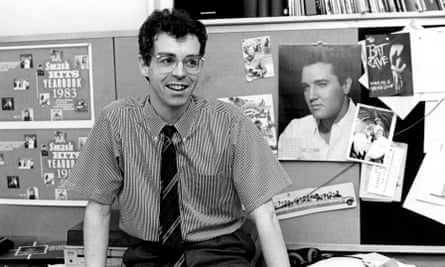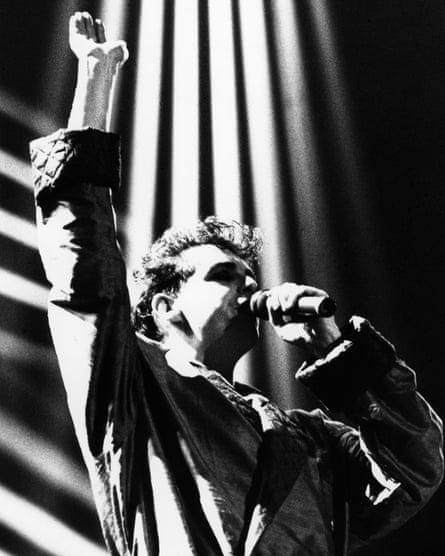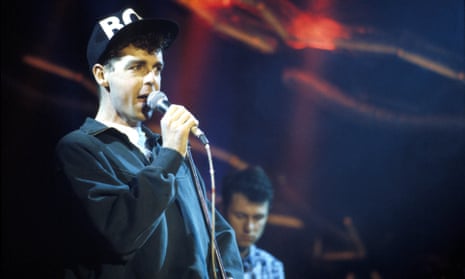We named West End Girls the greatest ever UK No 1. Did we get it right?
Well, I would have chosen Good Vibrations. It’s obviously intensely subjective. I can see that West End Girls is quite a lot of records in one record. It’s a dance record. It was actually written to be a rap record, back in the day. It’s a moody soundscape. It’s about the city at night. It’s about boys and girls meeting to have fun and presumably to bond [laughs]. It’s about sex. It’s paranoid. At the same time, its message is sort of like Dancing in the Streets – it’s about escape into the city at night, which is emblematic of pleasure.
When you were writing it, did you have a sense that these elements were potent ingredients for a pop song?
Oh, it was completely instinctive. It was written in early 83. I used to get the records ’cause of being at Smash Hits: Grandmaster Flash, Afrika Bambaataa. One day I was at my cousin’s and we’d watched a Jimmy Cagney movie. Before going to bed, the opening lines came into my head and so I turned the light on and wrote them down. I got back to London and went with it and wrote a rap. These were the days when Chris [Lowe] and I used to make demos in a little studio off Camden Road. Chris was down from Liverpool University. We went into the studio, and I said to Chris and the guy whose studio it was: “I’ve written this rap!” Rather embarrassingly, I then performed it. Luckily, they were mildly impressed.

Chris and I wrote a piece of music for it, and then ages later we wrote an instrumental with this very beautiful chord change, G major 7th with an E bass. Chris came up with the bassline. When I got home, it occurred to me that when [the track] moved up, you could sing the bit about the West End girls, which had previously been spoken. Amazingly, the first time I ever displayed this to Chris was when we met Bobby O at his New York studio. Bobby O said [loud American voice]: “OK guys, let’s do it!” We played the instrumental live straight on to tape. Bobby goes, “OK, vocal!” And so I go to the microphone and do the whole thing for the very first time. The assistant engineer, a woman called Tracy, said: “Oh, your voice is so easy to listen to!” It sort of had something. And then Bobby O did a load of keyboard overdubs. And there we have it. We recorded three other songs in an hour and a half.
When I went back to Smash Hits, I played three of the four tracks but I didn’t play West End Girls because I was embarrassed about me rapping. David Bostock, the assistant designer, had a cassette-copying setup at his flat. He copied the cassette and he came in and said: “Wow, I like the rap one!” I said: “Do you? I think it’s a bit embarrassing.” He said: “No, it’s great!” So I always think, in making a record and particularly a hit pop record, there’s an enormous amount of luck and serendipity. The way this record came about is not like the making of any other of our records, it’s a total one-off. And I think the record itself is, really.
What about the original Bobby O mix didn’t click with the public?
The Bobby O version is a great record still. It’s great to have a completely alternative version. Remember at this point, our career ambition was to have a record you could only buy on import in the gay record shop on Berwick Street, which we used to hang around in and where I used to buy imports on my Smash Hits expenses. And we achieved that – by September 1984, you could only buy West End Girls on a Canadian import in the Record Shack. Even as I say that to you, I’m quite thrilled.
Of course, once you’d got that far, you want to go further. We were a record – that’s all we were. We didn’t have an act – or we didn’t think we had an act. Nonetheless, I think people liked the record when they heard it. Kid Jensen played it on Radio 1; Gary Crowley. I shamelessly went around and gave it to people. Kid Jensen really liked it though. It would have been possible to have a one-off hit with it, but we didn’t have anything behind us and when it charted at No 116 or something, Epic dropped us. But the record did catch people’s imagination. One day at Smash Hits, the phone rang. It was a Belgian record company saying: “Your record is in the Top 20.” It was Top 30 in France. Chris and I did a bit of promotion in France and Belgium, and all these things made us realise that we did have something.
But I knew we couldn’t get there with just me representing us to the record company – we had to have a manager. Tom Watkins took us on as his first music management client and got us a deal with EMI. And so we rerecorded West End Girls with Stephen Hague. We said, we want this to sound filmic. And so the Stephen Hague version starts off like a film noir with someone walking down the street. The chord comes in, it’s quite sinister. You can feel the darkness. We spent a week in Advision Studios and at the end we had this much smoother version. But was it gonna be a hit? We discovered that the Bobby O version had done a lot of work for us because when [the Hague version] came out, people said: “Oh do you not know this record? It’s great.” And that happened in Europe and America. The record gradually became a hit in Britain and then it was sort of effortless. We were, of course, completely spoilt by this process – that we’d just had a hit record in America immediately without doing anything.
The Bobby O version came out in spring 1984, and the Hague version in autumn 1985. That period was so febrile – for society and pop. Did it feel as though the two versions arrived in very different pop contexts? Did it change what the song meant?
I don’t think it changed what the song meant, but it came out at the absolute height of Culture Club, Frankie Goes to Hollywood, Spandau Ballet, Duran Duran. What we were allied to, though, was none of that. We were a New York dance record and that was an amazing thing to be. There were people in New York who thought we were part of the New York dance scene, which was very thrilling. We were in Unique Studios, Arthur Baker was with Planet Patrol next door, so we didn’t come out of a British pop thing at all. When the second version came out, we were on EMI in England, we’d recorded the song in London, it was a British pop record. It felt like it belonged a bit more than the first version. Having said that, the Pet Shop Boys had the musical taste of the next pop wave, which was that dance music is going to become pop music by the end of the decade. We were at the beginning of that change so our timing was actually lucky, really, with the second version.

Does West End Girls have a queer perspective or has that been retrospectively applied?
I don’t think it does. I think it has an outsider perspective. Ultimately, it’s a celebration of heterosexuality! [laughs] Some of the East End boys might be getting together with West End boys. The idea is really that opposites attract, the glamorous posh girls and the beautiful rough East End boys all meeting in the West End and going clubbing or something. This was a very exciting time for clubbing in the West End of London. You’d go to the Wag Club and see George Michael dancing, and we’d go to Heaven where you heard Bobby O records and hi-NRG. You’d go to the Camden Palace and be in the Star Bar chatting to Spandau Ballet, and of course I knew them all ’cause of Smash Hits. And so the excitement of all these clubs went into our song. I lived such a busy life. I had a job at Smash Hits. Chris and I used to go to the studio, and then we’d go out – I would go to bed at 2am, 3am and be at Smash Hits at 10am, five days a week. Chris and I felt we had a new thing – gay, hi-NRG dance music and hip-hop. I remember the record company people from Factory came into the office one day saying: “The next thing’s gonna be Manchester meets New York.” I immediately felt jealous because it’s what Chris and I wanted to do. [Laughs.]
You had watched success happen to other pop stars. Was there anything surprising about being No 1?
The only sort of traumatic thing was appearing on Top of the Pops for the first time, probably only our third TV appearance – and we don’t have an act. We decide we’re not going to smile, we’re just going to be us. We’re not going to pretend. I watched it at EMI with the team. And I was sort of aghast. I think everyone thought it was terrible. Steve Wright introduced us and said we were “strange”, and I quite liked that. I’m wearing this long coat by [Blitz kid] Stephen Linard. Chris has got a leather jacket on and he’s playing the bassline very forcefully with one hand. But we very quickly realised, in that one performance, that’s what the Pet Shop Boys were. There it is – that’s the act. That was the thing that always stands out for me at the beginning – going on TOTP and not really knowing what to do. No one tells you what to do in pop music – you’re meant to come up with something.
I was watching the remote West End Girls performance you did for last weekend’s Smithsonian Pride festival. Does it mean something different singing it now from when you were 30?
Well, I still like it. I still feel the pathos of it. I always thought there’s a sense of loser-ness with our music. Or a sympathy with the people who are left out. If there’s ever an overt celebration of glamour, it’s probably satire. It was funny, we had to shoot the Smithsonian video separately. I was walking in a field in Kent, and I thought, this is really good light. I’ll try and do my lip-syncing. Luckily, no one walked past. I was putting quite a lot into it and I realised I was still feeling it. You can have hits that you’re sick to death of, but West End Girls has a promise of something that never goes away. A promise you want to keep.
You would release limited 12ins that wouldn’t earn you any royalties. That suggests a steadfast belief in the importance of the single. Does a single transcend the song?
Yes – it’s more difficult nowadays. When a single was a 7in, an A-side and a B-side, maybe just in a generic sleeve – people forget the picture sleeve was a European thing – there was something exciting about that. And the single was more like a manifesto: this is where we are now. That even carried on into the 80s. I always remember Régine from Island bringing in Two Tribes and playing it on the Smash Hits record player. You could tell it was a big cultural statement. I think it still can be now, but the way it’s delivered by digital platforms unfortunately waters down the thing.
Do you remember weeks where you felt vindicated by the No 1 – or furious that something you loved was beaten to the top spot?
Has anyone really got over Strawberry Fields/Penny Lane being kept off by Englebert Humperdinck? This is 53 years ago but I’m still annoyed about it! [laughs] Jean Genie. It took David Bowie quite a while to actually get a proper hit, and finally Jean Genie goes to No 2. And it’s got a Bo Diddley rhythm. The Sweet come up with Blockbuster, to all we Bowie fans copying the same guitar – and it gets to No 1. I’m still annoyed about that. I felt they’d ripped off what David Bowie was trying to rip off. Find your own thing to rip off! [laughs] I must say, looking through your list, it’s great what does get to No 1. I Feel Love by Donna Summer.
Our commenters were so angry about Dead or Alive.
I thought that was a great choice. Interestingly, though, I didn’t know that had been a No 1. I had that down as a No 3 kind of record, so I was pleased, retrospectively, to realise. But this is where the whole thing is subjective. It’s always good to wind up the punters, let’s face it. The comments below [the West End Girls entry] will no doubt reflect that.
Not many people guessed. A lot of them thought a Beatles No 1 was a foregone conclusion.
Hey Jude?
She Loves You, No 3.
[Audibly raising an eyebrow] It’s not Hey Jude… When She Loves You was No 1, I was nine years old. My auntie Sally bought it for us. That song was so omnipresent in your childhood, it was actually like a folk song. You would see girls playing hopscotch on the street and they would sing She Loves You. It was omnipresent in the playground. It was the idea of a pop song for ages. And also it’s a very thrilling record. Actually, it’s a good choice. Controversial choice in a way, but a good choice.
